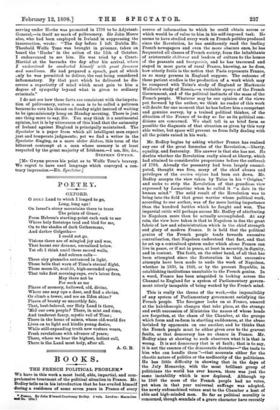WOLFE TONE.
[To TEE EDITOR OF TEE "SrscuTOB.1
SIR,—Your reviewer, writing of "Dublin in the Eighteenth. Century " in the Spectator of February 5th, corrects Miss Gerard for confusing Matthew Tone with his more celebrated' brother, and adds the following sentence : " Wolfe Tone was captured on board a French ship of the line in Lough Swilly some weeks later, and died, as he had lived, a poltroon.' This seems to me an inaccuracy of a very different nature from Miss Gerard's, and I hope that your reviewer will produce his grounds for an estimate of Tone's character so opposed to• that generally received. The heart of man is inscrutable, and Wolfe Tone may have been a poltroon at bottom ; but 1 derive no such impression from reading his Journal, and least of all do I see any trace of poltroonery in the circum- stances which led to his death.
In 1798 Tone was in France, engaged in his unremitting attempts to secure French assistance for an Irish rebellion. Humbert's insane expedition landed on August 22nd—after the insurrection had been fairly quelled—and on Septem- ber 20th it was followed by the not less absurd expedition under Hardy and Bompart. Wolfe Tone knew perfectly well that to take three thousand men to a country where rebellion had just been put down with the heaviest of hands. was sheer folly ; but if they sent a corporal's guard he felt bound to go with it. Accordingly he sailed on the ' Roche.' The flotilla of one seventy-four, eight frigates, and the' ' Biche ' schooner was scattered, and on October 11th only the Roche," Loire," Resolve,' and Biche' made Lough Swilly. They were signalled at once, and Warren's squadron was seen bearing down on them. There was no chance of escape for the seventy-four, but a boat was going with the Admiral's orders to the ' Biche,' which vessel seemed likely to get clear away, and actually did so. The French officers pressed Wolfe Tone to go in her because his risk was different from theirs. Tone replied that if the French stayed there to fight for his country, his place was with them. The Roche' fought for six hours against four sail of the line and a frigate in Lough Swilly, and Tone commanded one of the batteries in the action. When she struck, he was taken with, the other prisoners of war to Letterkenny ; but on being recognised there, was thrown into irons as a traitor and taken to Dublin, where a military Court tried him and- sentenced him to be hung. His request that be might be shot by files of Grenadiers—as Charette and De Sombreuit had been in France—was disregarded, and public execution was ordered. Tone cut his throat in prison with a pen- knife, but life was still in him, and his wound was dressed that the sentence might be carried out This barbarity was only prevented by a writ of Habeas Corpus from Lord Kilwarden, the Lord Chief Justice, granted on Curran's Motion. Curran insisted that as Tone was not in the British Army, a Court-Martial had no jurisdiction over him while the Court of King's Bench was sitting. A delay was thous obtained, and Wolfe Tone died in prison after lingering for eight days.
It should be added that he received the rank of Chef de. Brigade in the Army of the French Republic, and after•
serving under Hoche was promoted in 1798 to be Adjutant- General,—in itself no mark of poltroonery. Sir John Moore also, who had been employed in Ireland in suppressing the insurrection, wrote: "The day before I left Dublin Mr. Theobald Wolfe Tone was brought in prisoner, taken on board the ' Hoche' in the action of the 12th of October. I endeavoured to see him. He was tried by a Court- Martial at the barracks the day after his arrival, where I understand he conducted himself with great firmness and manliness. He had prepared a speech, part of which Unly he was permitted to deliver, the rest being considered inflammatory. By that part which he delivered he die- covers a superiority of mind which must gain to him a degree of sympathy beyond what is given to ordinary criminals."
I do not see how these facts are consistent with the imputa- tion of poltroonery, unless a man is to be called a poltroon because he cuts his throat on Sunday night instead of waiting to be ignominiously hung on Monday morning. There is just one thing more to say, Sir. You may think it a sentimental opinion, but it is by utterances of this kind that the animosity of Ireland against England is principally maintained. The Spectator is a paper from which all intelligent men expect just and temperate judgments; yet we find a writer in the Spectator flinging, as a mere obiter dictum, this term of the bitterest contempt at a man whose memory is at least respected by the great majority of Irishmen.—I am, Sir, &c.,
STEPHEN GWYNN.
[Mr. Gwynn proves his point as to Wolfe Tone's bravery. We regret to have used language which conveyed a con- trary impression.—ED. Spectator.]







































 Previous page
Previous page